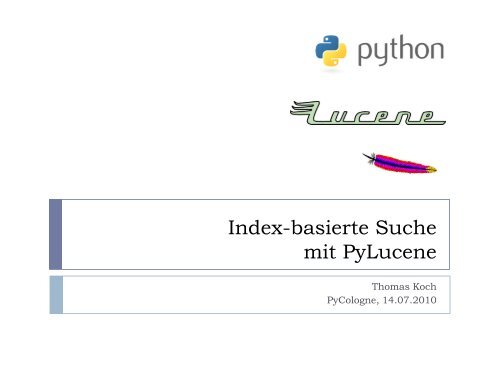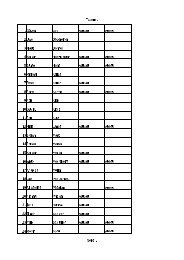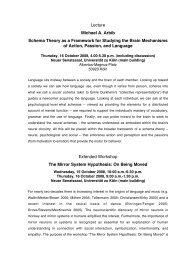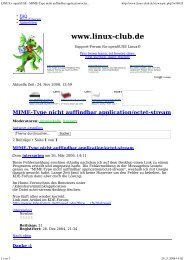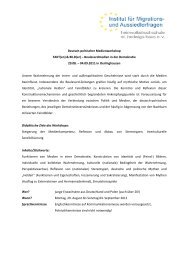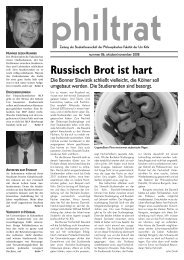Index-basierte Suche mit PyLucene
Index-basierte Suche mit PyLucene
Index-basierte Suche mit PyLucene
You also want an ePaper? Increase the reach of your titles
YUMPU automatically turns print PDFs into web optimized ePapers that Google loves.
<strong>Index</strong>-<strong>basierte</strong> <strong>Suche</strong><br />
<strong>mit</strong> <strong>PyLucene</strong><br />
Thomas Koch<br />
PyCologne, 14.07.2010
Agenda<br />
Einführung <strong>Index</strong>-<strong>basierte</strong> <strong>Suche</strong><br />
Motivation und Begrifflichkeiten<br />
Was ist <strong>PyLucene</strong><br />
Features<br />
Historie<br />
Anwendung von <strong>PyLucene</strong><br />
<strong>Index</strong> erstellen<br />
Suchanfragen<br />
Demonstration von <strong>PyLucene</strong><br />
Hands-on & Code-Beispiele<br />
Weiterführende Themen<br />
Links, Literatur, Related work<br />
Thomas Koch<br />
7/2010
Einführung: <strong>Index</strong>-<strong>basierte</strong> <strong>Suche</strong><br />
Grundlagen <strong>Index</strong>-<strong>basierte</strong>r <strong>Suche</strong>:<br />
<strong>Index</strong> verwaltet 'Dokumente' (abstraktes Objekt)<br />
pro Dokument: versch. Metadaten (i.W. key-value)<br />
Inhalte werden im (invertierten) <strong>Index</strong> verwaltet<br />
(optimiert für Suchanfragen)<br />
<strong>Index</strong>er benötigen Text-Darstellung!<br />
<strong>Suche</strong>: Anfrage über Felder und Werte (sog. „Terme“)<br />
Abfrage über <strong>Index</strong> liefert Ergebnisse ("Hits")<br />
Thomas Koch<br />
7/2010
Herausforderungen bei <strong>Index</strong>ierung<br />
<strong>Index</strong>ierung<br />
Daten/Dateistrukturen (für <strong>Index</strong>)<br />
Textanalyse (Stemmer, Tokenizer …)<br />
<strong>Suche</strong><br />
Abfragesprache (Query Language)<br />
Matching-Algorithmen, Ranking (Scores) etc.<br />
Allgemein<br />
Mehrsprachigkeit (Encodings, Stop-Wörter, Plural …)<br />
Extraktion der Daten (z.B. Web-Crawler)<br />
Konvertierung (Dokument-Formate)<br />
Performance!!!<br />
Thomas Koch<br />
7/2010
Lösung: Frameworks für Suchmaschinen<br />
Einfaches Muster:<br />
1. <strong>Index</strong>ierung : Dokumente TextAnalyse <strong>Index</strong><br />
2. <strong>Suche</strong>: Anfrage Parsing / Query Resultat<br />
3. Visualisierung der <strong>Suche</strong>rgebnisse (Anwendungsabhängig)<br />
Unterstützung durch Framework: Java Lucene<br />
Lucene is a high-performance, full-featured text search engine written<br />
entirely in Java. It is a technology suitable for nearly any application that<br />
requires full-text search, …<br />
API (Auszug…)<br />
org.apache.lucene.analysis convert text into indexable/searchable tokens.<br />
org.apache.lucene.document logical representation of a Document<br />
org.apache.lucene.index maintain and access indices<br />
org.apache.lucene.queryParser query parser<br />
org.apache.lucene.search search indices<br />
org.apache.lucene.store Binary I/O API, used for all index data<br />
org.apache.lucene.util utility classesThomas Koch<br />
7/2010
Was ist <strong>PyLucene</strong>?<br />
About<br />
<strong>PyLucene</strong> ist eine Python Erweiterung (package 'lucene')<br />
<strong>PyLucene</strong> erlaubt Zugriff auf alle Lucene Features von Python<br />
Implementierung:<br />
<strong>PyLucene</strong> ist keine Portierung nach Python, sondern „Wrapper“ um<br />
Java Lucene!<br />
<strong>PyLucene</strong> embeds a Java VM with Lucene into a Python process.<br />
Python Module sind durch JCC generiert (aus Java-Sourcen):<br />
<strong>PyLucene</strong> is built with JCC, a C++ code generator that makes it possible to call<br />
into Java classes from Python via Java's Native Invocation Interface (JNI).<br />
Aktuelle Version(en)<br />
<strong>PyLucene</strong> 3.0.2-1 and 2.9.3-1 (Juli 2010)<br />
JavaLucene 2.9.3: Java 2.x series, based on Java 1.4.<br />
JavaLucene 3.0.2: Java 3.x series, based on Java 5.<br />
Thomas Koch<br />
7/2010
Was ist <strong>PyLucene</strong>?<br />
Features<br />
Vollständige Abdeckung von Java Lucene in Python<br />
API fast 1:1 kompatibel (zu Java-Lucene)<br />
Abhängigkeiten<br />
Runtime: Erfordert Python 2.x (x>=3) und Java 1.4+<br />
Build: Erfordert make, ant, C++ compiler<br />
Läuft auf Mac OS X, Linux, Solaris und Windows<br />
Historie<br />
Lucene 1.0: entwickelt von Doug Cutting (2000)<br />
http://cutting.wordpress.com/<br />
<strong>PyLucene</strong> : entwickelt von Andi Vajda<br />
Zunächst GCJ-compiled version of Java Lucene integrated with Python (~2004)<br />
Später als JCC-generated Python wrapper around Java Lucene (2007)<br />
http://blog.chandlerproject.org/author/vajda/<br />
Seit V2.4 is <strong>PyLucene</strong> subproject of the Apache Lucene project (2009)<br />
http://lucene.apache.org/pylucene/<br />
Thomas Koch<br />
7/2010
Anwendung von <strong>PyLucene</strong><br />
Übersicht der wichtigsten Module<br />
Document<br />
Einheit der <strong>Index</strong>ierung; i.W. Menge von Feldern (Field)<br />
Field<br />
Teil eines Document; Name,Value; Properties: indexed, stored<br />
Term<br />
Wort in einem Document; wird zur <strong>Suche</strong> verwendet<br />
<strong>Index</strong>Writer<br />
<strong>Index</strong> anlegen und erweitern<br />
<strong>Index</strong>Reader<br />
Nur lesender Zugriff, oder: <strong>Index</strong> ändern (delete Document)<br />
<strong>Index</strong>Searcher<br />
<strong>Suche</strong> durchführen<br />
Analyser<br />
Textanalyse: extrahiert Terme aus einem Text<br />
Thomas Koch<br />
7/2010
Dokumente und Felder<br />
http://it-republik.de/zonen/magazine/onlineartikel/pspic/picture_file/94/Bild14a168ae122fb6.jpg<br />
Thomas Koch<br />
7/2010
<strong>Index</strong> : Segmente und Dokumente<br />
http://www.ibm.com/developerworks/opensource/library/wa-lucene/logic_view.gif<br />
Thomas Koch<br />
7/2010
Anwendung von <strong>PyLucene</strong>: <strong>Index</strong>ierung<br />
<strong>Index</strong> anlegen<br />
analyzer = lucene.StandardAnalyzer()<br />
store = lucene.SimpleFSDirectory(lucene.File(storeDir))<br />
writer = lucene.<strong>Index</strong>Writer(store, analyzer, True, # create<br />
lucene.<strong>Index</strong>Writer.MaxFieldLength.LIMITED)<br />
<strong>Index</strong> erstellen<br />
for file in files:<br />
doc = lucene.Document()<br />
# store path info for later use<br />
doc.add(lucene.Field("path", get_path(file),<br />
lucene.Field.Store.YES,<br />
lucene.Field.<strong>Index</strong>.NOT_ANALYZED))<br />
contents = file.readlines()<br />
doc.add(lucene.Field("contents", contents,<br />
lucene.Field.Store.NO,<br />
lucene.Field.<strong>Index</strong>.ANALYZED))<br />
# index document:<br />
writer.addDocument(doc)<br />
Thomas Koch<br />
7/2010
Anwendung von <strong>PyLucene</strong>: <strong>Suche</strong><br />
Suchanfrage vorbereiten<br />
directory = SimpleFSDirectory(File(storeDir))<br />
searcher = <strong>Index</strong>Searcher(directory, True) # readOnly<br />
analyzer = StandardAnalyzer() # same as for indexing<br />
Suchanfrage durchführen<br />
query = QueryParser("contents", analyzer).parse(queryStr)<br />
# perform query on index and get max=50 results<br />
scoreDocs = searcher.search(query, 50).scoreDocs<br />
# finally show results<br />
for scoreDoc in scoreDocs:<br />
doc = searcher.doc(scoreDoc.doc) # get Document from index<br />
print ‘match:', doc.get("path“)<br />
Thomas Koch<br />
7/2010
Anwendung von <strong>PyLucene</strong><br />
<strong>PyLucene</strong> Initialisierung<br />
vor dem Aufruf von <strong>PyLucene</strong> muss JVM geladen werden<br />
>> import lucene<br />
>> lucene.initVM(classpath=lucene.CLASSPATH)<br />
Angabe weiterer VM-Parameter möglich: initialheap, vmargs etc.<br />
<strong>PyLucene</strong> Konfiguration und Optimierung<br />
writer.setMaxBufferedDocs(int)<br />
minimal number of documents before the buffered documents are flushed<br />
writer.setMaxFieldLength(int)<br />
maximum number of terms per field<br />
writer.setXYZ ()<br />
MergePolicy, MaxMergeDocs,MergeFactor …<br />
writer.optimize()<br />
<strong>Index</strong>-Optimierung anstossen (Synchron oder asynchron)<br />
writer.close()<br />
Auch auf reader und searcher immer close() aufrufen!<br />
Thomas Koch<br />
7/2010
Code-Beispiel<br />
Thomas Koch<br />
Demonstration<br />
7/2010
Weiterführende Themen / Infos<br />
Specials<br />
Lucene-Features: Filter, Scorer, Explanation, Boosting etc.<br />
Verschiedene/eigene Analyzer: GermanAnalyzer<br />
Verschiedene/eigene Query-Methoden: FuzzyQuery<br />
<strong>PyLucene</strong> in Python erweitern: PorterStemmerAnalyzer<br />
Build JCC/<strong>PyLucene</strong> from source…<br />
Related<br />
Apache Solr http://lucene.apache.org/solr/<br />
A powerful full-text search, hit highlighting, faceted search,<br />
dynamic clustering, database integration, and rich document<br />
(e.g., Word, PDF) handling.<br />
Literatur<br />
Lucene in Action, Manning Pub. (2nd Edition)<br />
Beispiel-Code aus LIA-Buch in Distribution! (/samples)<br />
http://www.manning.com/hatcher2/<br />
Dr. Christian Herta „Indizierung <strong>mit</strong> Lucene“<br />
Suchtechnologie und Information Retrieval<br />
http://www.christianherta.de/<br />
Thomas Koch<br />
7/2010
Links<br />
Sample Data:<br />
Enron Email Dataset<br />
http://www.cs.cmu.edu/~enron/<br />
517k files<br />
1.3GB text<br />
Lucene <strong>Index</strong> Viewer<br />
Luke - Lucene <strong>Index</strong> Toolbox<br />
http://code.google.com/p/luke/<br />
Apache <strong>PyLucene</strong><br />
project home page: http://lucene.apache.org/pylucene<br />
mailing list: pylucene-dev@lucene.apache.org<br />
svn repo: http://svn.apache.org/repos/asf/lucene/pylucene/<br />
Thomas Koch<br />
7/2010
Breaking News:<br />
JCC and <strong>PyLucene</strong> ported to Python 3.0<br />
Am 12.07.2010, 21:38 Uhr, schrieb AndiVajda :<br />
> Today, I ported JCC and <strong>PyLucene</strong> (trunk) to Python 3.1.2<br />
> on Mac OS X 10.6.<br />
> All unit tests and Lucene in Action samples pass. 2to3 did wonders. So<br />
> did the docs for all the manual C code changes.<br />
><br />
> If you'd like to check it out:<br />
> - install Python 3.1.2<br />
> - install the latest distribute<br />
> - check out<br />
> http://svn.apache.org/repos/asf/lucene/pylucene/branches/python_3/<br />
><br />
> Bugs, comments, etc.. welcome !<br />
><br />
> Andi..<br />
Thomas Koch<br />
7/2010


